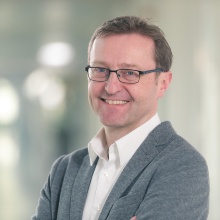Prof. Steffen Staab has been appointed to the “Analytic Computing” Cyber Valley professorship at the University of Stuttgart as of 1 February 2020, and will drive forward the founding of the Institute for Artificial Intelligence. With the internationally recognized and much-cited experts in databases and information systems, there are now four Cyber Valley scientists based at the University of Stuttgart. Staab’s focus is in the area of semantic technology, a branch of research which makes the significance of data easier to understand.
Prof. Wolfram Ressel, Rector at the University of Stuttgart, warmly welcomed Prof. Steffen Staab. “By focusing on information systems and data analysis, Prof. Staab will make the research into intelligent systems carried out at the University of Stuttgart and in Cyber Valley even stronger. It makes us particularly happy that Staab also decided on the University of Stuttgart because of the interdisciplinary nature of our university. This confirms the particular profile of the University of Stuttgart as the “Stuttgarter Weg (Stuttgart Way)”, which stands for a consistent interdisciplinary network of complementary specialist disciplines, as well as the integration of engineering, natural sciences, the humanities and social sciences.”
Staab himself expects numerous cooperation opportunities while working in Cyber Valley and the University of Stuttgart to further his research in the area of semantic technologies, both in basic and applied research, and in the process also questioning the implications for society. “Cyber Valley is one of the earliest and biggest initiatives in Germany for strengthening research into artificial intelligence. And Computer Science at the University of Stuttgart is also excellently well positioned, which is shown by two Clusters of Excellence among other things, and there is an established culture of interdisciplinary collaboration between technical sciences, the humanities and social sciences”, emphasized the scientist.
Semantic technologies as a research focus
Staab’s field of research in semantic technologies is committed to gaining an understanding of the significance of data and information. The significance can be presented in the form of conceptual models and ontologies. They form the basis for knowledge networks, which enable the computer to handle data in a meaningful way.
In order to find the most meaningful model, algorithm-based analysis procedures are used such as text and data mining, as well as information extraction (e.g. by means of ontology learning and text clustering). Connections between data and how it is used in context (for example by a smartphone) can be investigated in this way. This is how knowledge networks are found in data, which is especially significant in the context of social networks.
The biggest construct for communicating data of significance is the World Wide Web. Web science investigates how networks of people and knowledge in the Web emerge, as well as how people handle it and what consequences it has for us. “The Web is a machine of significance that I want to come to understand through my research”, says Staab.
About Prof. Steffen Staab
Steffen Staab was born in 1970 and studied Computer Science and Computer Linguistics at the University of Erlangen-Nuremberg and at the University of Pennsylvania. In 1998, he graduated from the University of Freiburg with a PhD in Computer Science. Afterwards, he worked at the Institute of Human Factors and Technology Management (IAT) at the University of Stuttgart as well as at the Fraunhofer Institute for Industrial Engineering (IAO), and later moved to the University of Karlsruhe (now known as KIT). In 2004, Staab was appointed as Professor of Databases and Information Systems at the University of Koblenz and Landau, where he founded the Institute for Web Science and Technologies (WeST) in 2009. Since March 2015 he has also held a Chair for Web and Computer Science at the University of Southampton.
Four Cyber Valley scientists at the University of Stuttgart
With Prof. Steffen Staab, there are now four Cyber Valley scientists working at the University of Stuttgart. Michael Sedlmair, who is junior professor at the Institute for Visualization and Interactive Systems (VIS), works in the department of Augmented and Virtual Reality. Dr. Tian Qiu leads the Cyber Valley research group “Biomedical Microsystems” at the Institute of Physical Chemistry (IPC). Since January 2020, Prof. Alexander Brem has held the chair for ‘Entrepreneurship in technology and digitalisation’.
About the Cyber Valley
The Cyber Valley is one of the biggest research collaborations in Europe in the field of artificial intelligence, with partners from politics, science, business and society. The partnership strengthens research and teaching in the fields of machine learning, computer vision and robotics, as well as the connections between these scientific disciplines. The partners include the Max Planck Institute for Intelligent Systems (MPI-IS), the universities of Tübingen and Stuttgart, the state of Baden-Württemberg, the Fraunhofer Institute, as well as seven industrial companies.


